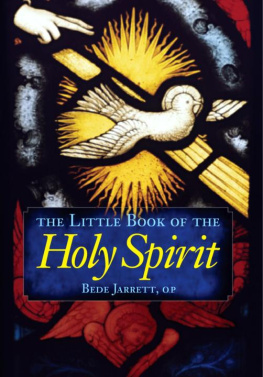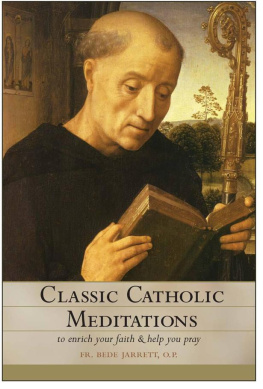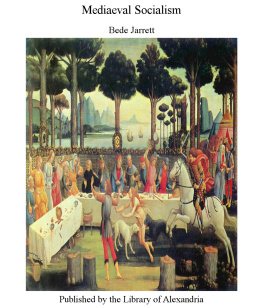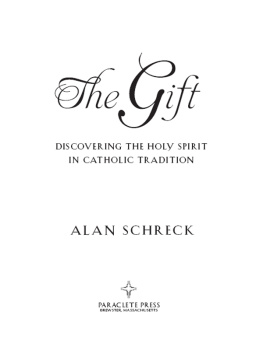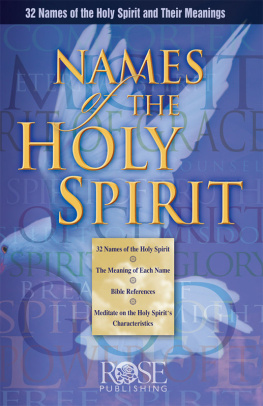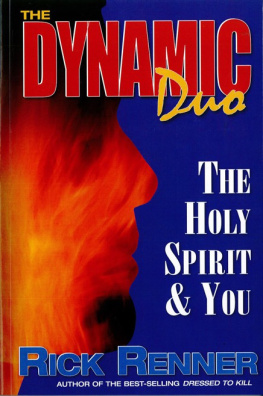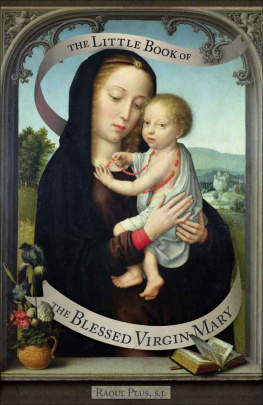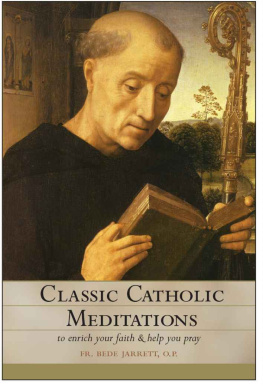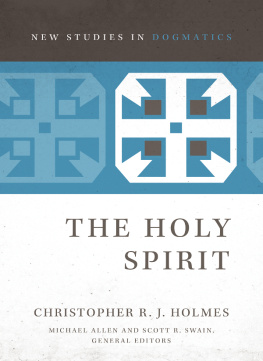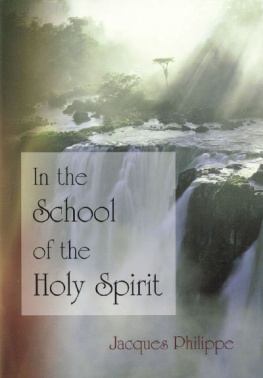Bede Jarrett - The Little Book of the Holy Spirit
Here you can read online Bede Jarrett - The Little Book of the Holy Spirit full text of the book (entire story) in english for free. Download pdf and epub, get meaning, cover and reviews about this ebook. year: 2005, publisher: Sophia Institute Press, genre: Religion. Description of the work, (preface) as well as reviews are available. Best literature library LitArk.com created for fans of good reading and offers a wide selection of genres:
Romance novel
Science fiction
Adventure
Detective
Science
History
Home and family
Prose
Art
Politics
Computer
Non-fiction
Religion
Business
Children
Humor
Choose a favorite category and find really read worthwhile books. Enjoy immersion in the world of imagination, feel the emotions of the characters or learn something new for yourself, make an fascinating discovery.
- Book:The Little Book of the Holy Spirit
- Author:
- Publisher:Sophia Institute Press
- Genre:
- Year:2005
- Rating:4 / 5
- Favourites:Add to favourites
- Your mark:
- 80
- 1
- 2
- 3
- 4
- 5
The Little Book of the Holy Spirit: summary, description and annotation
We offer to read an annotation, description, summary or preface (depends on what the author of the book "The Little Book of the Holy Spirit" wrote himself). If you haven't found the necessary information about the book — write in the comments, we will try to find it.
The Little Book of the Holy Spirit — read online for free the complete book (whole text) full work
Below is the text of the book, divided by pages. System saving the place of the last page read, allows you to conveniently read the book "The Little Book of the Holy Spirit" online for free, without having to search again every time where you left off. Put a bookmark, and you can go to the page where you finished reading at any time.
Font size:
Interval:
Bookmark:

Bede Jarrett, O.P.
................................. vii
God's presence within us
.................... 5
. 9
........ 13
................ 17
.. 21
....... 29
...... 33
.. 37
God's loving action within us
.. 43
......... 47
Our presence with God
......... 53
.......... 57
.............. 63
.............. 67
God's gifts within us
......... 73
........ 77
........ 81
.......... 85
..... 89
.................... 93
................. 97
................ 101
................. 105
....... 109
.................. 113
......................... 117
Hardly anything can render us more sensible of our worth and Christian dignity than does the teaching of our Lord on the indwelling of the Spirit of God. The wonderful beauty of this teaching, while it deepens our acquaintance with His mysterious governance of the universe and reveals to us the hidden beauties of our soul's life, should bring also its measure of comfort, for whatever makes us conscious of the intimacy of God's dealing with us lessens life's greatest trouble, its loneliness.
Bede Jarrett, O.P.
Our Lady of Lourdes
New York
February 11, 1918
Now, this notion of God's nearness to His world depends for its full appreciation on the central doctrine of creation. He has made the world; in consequence it is impressed with His personality; the more vigorous the artificer-the more vigorous, that is, in character, will, and personality-the more is his work stamped with his individuality; hence, the tremendous personality of God must be traceable everywhere in the things He has made.
When we say God is everywhere, we mean that He is in all things because He made all things. Not only does the whole world lie outstretched before His eye and is governed by His power, but He Himself lurks at the heart of everything. By Him things have come into existence, and so wholly is that existence of theirs His gift, that were He to withdraw His support, they would sink back into nothingness.
tells how a monk in Spain, pointing to the pictures on the walls of the monastery, which remained while the generations looking at them passed away, judged: "We are the shadows, they the substance." But the relationship established by creation is of a far greater dependence, so that nothing God has made can exist without His support. Out of human acts it is only music that bears some resemblance to this, for when the voice is silent, there is no longer any song.
God, then, is within all creation, because He is its cause. He is within every stone and leaf and child. Nothing, with life or without, evil or good, can fail to contain Him as the source of its energy, its power, and its existence; He is "the soul's soul." Not only, therefore, must I train myself to see with reverence that everything contains Him, but I must especially realize His intimacy and relationship to myself. Religion, indeed, in practice is little else than my personal expression of that relationship.
In my prayers, in my troubles, in my temptations, I have to turn to God, not without but within; not to someone above me or beneath me, supporting me, but right at the core of my being. I can trace up to its source every power of my soul-my intelligence, my will, my love, my anger, and my fear-and I shall find Him there. There is nothing that does not open its doors to Him as innermost in its shrine. Wholly is God everywhere, not as some immense being that with its hugeness fills the world, but as something that is within every creature He has made.
God is intimate with all creation because He made it, for creation implies that God remains withinsupporting, upholding. God is within everything, and therefore He is everywhere. But while we thus believe that God is wholly everywhere, we also believe something which seems the exact opposite, for we believe that God is more in some places than in others, more in some people than in others.
How is it, if God is wholly everywhere, that He can be more here than there? To understand this we must also understand that every created thing shares somehow in God's being. He communicates Himself to it in some fashion, for apart from Him it could have no perfections. We have a way of saying that we reflect God's greatness and that we are "broken lights" of Him. But Not, of course, that there is any community of being, but rather a direct participation.
Now, since everything participates in God and since some things are more excellent than others, it stands to reason that some things express God better than others. The eyes of a dog often are pitiful to see, because we can note its evident desire and yet its impossibility to express its feelings. To seeing minds the whole of nature has the same pitifulness. It is always endeavoring to express God, the inexpressible.
Yet the higher a thing is in the scale of being, the more of God it expresses, for it participates more in God's being. The more life a thing has and the more freedom it acquires, the nearer does it approach God and the more divinity it holds. Man, by his intelligence, his deeper and richer life, and his finer freedom, stands at the head of visible creation and, in consequence, is more fully a shrine of God than are lower forms of life. He bears a closer resemblance to the divine intelligence and will and has a greater share in them. It is, then, in that sense that we arrange in ascending order inanimate creation, the vegetable kingdom, the animal kingdom, and man.
Consequently we can now see in what sense God is said to be more in one thing than in another. He is more in it because He exercises Himself more in one thing than in another; one thing expresses more than another the perfections of God because it shares more deeply than another that inner being of God. The more nearly anything or anyone is united to God, the more does His power exercise itself in them. Since God's gifts are variously distributed and are of various degrees, we are justified in saying that although He is wholly everywhere, He may be more fully here than there; just as, although my soul is in every part of my being, it is more perfectly in the brain than elsewhere, because there it exercises itself more fully and with more evidence of expression. Thus we say God is more in a man's soul than anywhere else in creation, since in a man's soul God is more perfectly expressed. It is therefore with great reverence that I should regard all creation, but with especial reverence that I should look to the dignity of every human soul.
Font size:
Interval:
Bookmark:
Similar books «The Little Book of the Holy Spirit»
Look at similar books to The Little Book of the Holy Spirit. We have selected literature similar in name and meaning in the hope of providing readers with more options to find new, interesting, not yet read works.
Discussion, reviews of the book The Little Book of the Holy Spirit and just readers' own opinions. Leave your comments, write what you think about the work, its meaning or the main characters. Specify what exactly you liked and what you didn't like, and why you think so.

